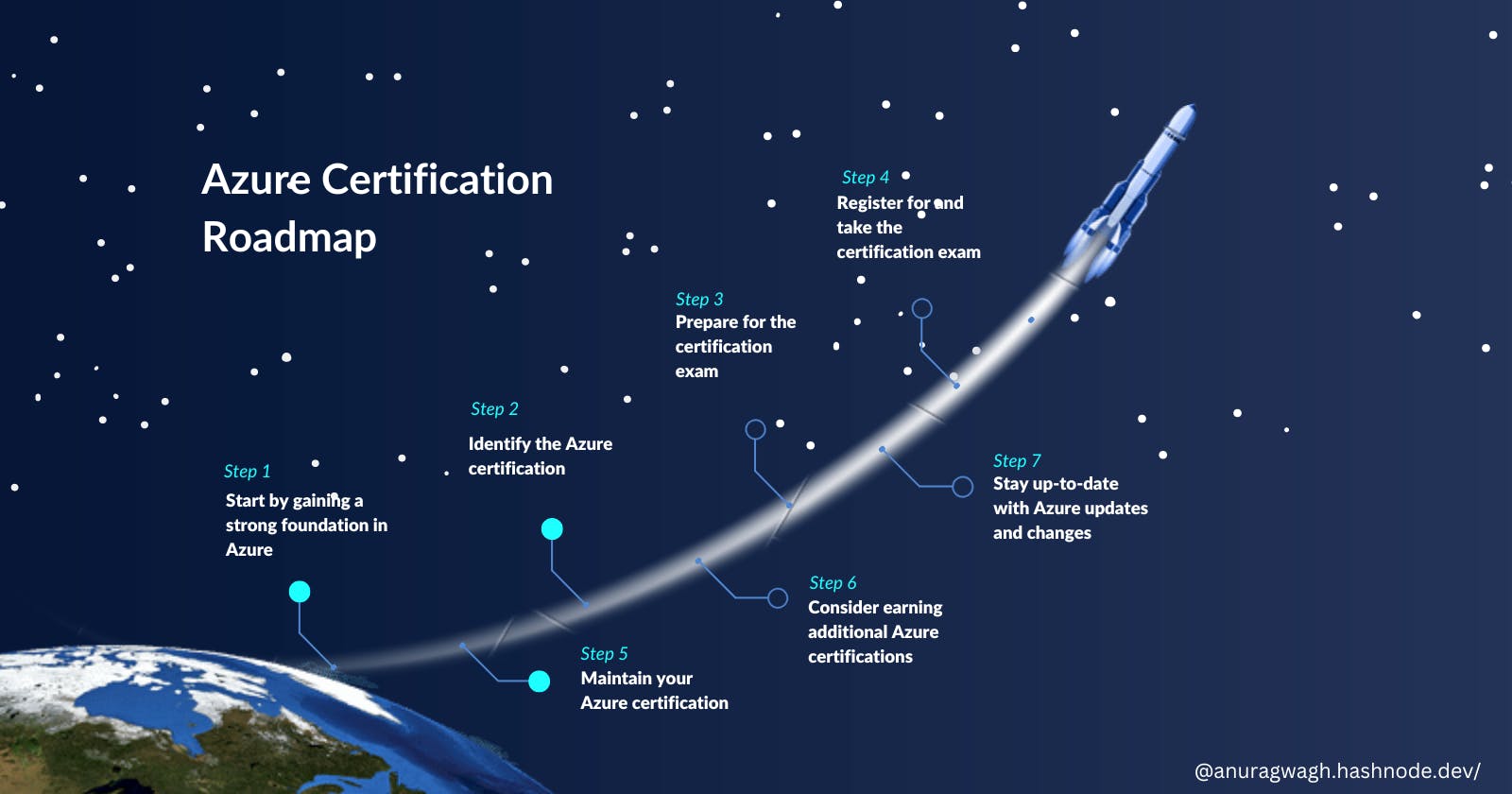Table of contents
No headings in the article.
Microsoft Azure is a cloud computing platform and infrastructure created by Microsoft for building, deploying, and managing applications and services through a global network of Microsoft-managed data centers. It provides a range of cloud services, including that computing, analytics, storage, and networking. Users can choose and configure these services to meet their specific needs.
There are several Azure certifications available, each catering to a specific role and level of expertise. These certifications demonstrate a candidate's skills and knowledge in using Azure services and tools to design, develop, implement, maintain, and secure Azure solutions.
If you are planning to pursue an Azure certification, here is a roadmap that you can follow:
Start by gaining a strong foundation in Azure:
Familiarize yourself with the Azure portal and the various Azure services and tools available.
Learn about Azure resource management, including how to create and manage Azure resources, resource groups, and subscriptions.
Understand the concepts of Azure networking, including virtual networks, subnets, network security groups, and Azure Domain Name System (DNS).
Learn about Azure storage, including storage accounts, blobs, files, and tables.
Identify the Azure certification that best aligns with your career goals and current level of expertise:
Microsoft offers a range of Azure certifications, including those for developers, data scientists, data engineers, solutions architects, and DevOps professionals.
Consider your current role and the skills and knowledge you already have, and choose a certification that will help you build upon those foundations and advance your career.
Prepare for the certification exam:
Review the exam objectives and skills measured, which are available on the Microsoft Learning website.
Enroll in an Azure training course or workshop to gain hands-on experience and in-depth knowledge of the technologies and services covered in the exam.
Practice using Azure services and tools through hands-on labs and exercises.
Consider using study materials such as practice exams and study guides to help you prepare for the exam.
Register for and take the certification exam:
Once you feel confident in your knowledge and skills, register for the certification exam through the Microsoft Learning website.
The certification exams are delivered through Pearson VUE testing centers. You will need to schedule a time and location to take the exam.
On the day of the exam, arrive at the testing center early and bring any necessary identification documents.
After completing the exam, you will receive your exam results immediately. If you pass the exam, you will receive a certificate indicating your achievement.
Maintain your Azure certification:
Microsoft Azure certifications are valid for two years. To maintain your certification, you will need to earn a certain number of continuing education credits (CEUs) during this time.
There are several ways to earn CEUs, including attending Azure training courses and workshops, participating in Azure-related events and conferences, and completing online training programs.
You can track your CEUs and renew your certification through the Microsoft Certification Dashboard.
Consider earning additional Azure certifications:
Once you have earned an Azure certification, you may want to consider pursuing additional certifications to expand your knowledge and skills and advance your career further.
Microsoft offers several advanced Azure certifications, including those for Azure experts and Azure specialists. These certifications require a higher level of expertise and may involve additional exams and/or hands-on experience.
You can also consider earning certifications in other technology areas, such as data science or artificial intelligence, to further broaden your skillset and increase your value as a professional.
Stay up-to-date with Azure updates and changes:
As a certified Azure professional, it is important to stay current with the latest developments and updates in the Azure platform.
Microsoft frequently releases new features and services, and it is important to keep up with these changes to ensure that you are using the most current and effective tools and techniques.
There are several resources available to help you stay up-to-date, including the Azure blog, Azure documentation, and Azure user groups and communities.
Participating in these resources can help you stay current with Azure developments and enhance your skills as an Azure professional.
In conclusion, earning an Azure certification can help you demonstrate your expertise in using Azure services and tools and advance your career in the field of cloud computing. By following the roadmap outlined above and preparing for the certification exam, you can earn an Azure certification and become a valuable asset to any organization. It is important to maintain your certification by earning continuing education credits and staying up-to-date with Azure updates and changes to ensure that you are at the forefront of the industry.
